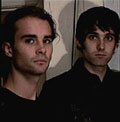
Directed by
George Goularas
98 minutes
Rated TBA
Reviewed by
Bernard Hemingway

The Silent Mangoes
The Silent Mangoes is the story of a young woman (Shelly Lauman) intrigued by two impecunious young men (André Jewson and Mark Winter) and consequently moves into their house when they offer a room to rent.
Made for a measly $500, writer-director George Goularas’s debut feature film, shot over 11 days in various locations around Melbourne, shows that money is not essential to the making of a strong film. Writing and performances are, and The Silent Mangoes has these in spades. Where one ends and the other begins is not easy to say and this is a credit to both Goularas and his cast who, one feels, are equally responsible for the film’s success.
The Silent Mangoes opens as a comedy and runs like this for its first half as we are introduced to the two brothers, Julian (Jewson), a serious-minded apprentice bookbinder, and Poe (Winter), a charmingly irresponsible writer, and the young florist (Lauman) attracted by their unusual closeness to each other yet remoteness from the world at large.
As a writer Goularas is very good at describing relationships but as a director he is also fortunate in his cast. Winter, who has the looks and charisma of a young Daniel Day-Lewis, makes what might have been a very tiresome character into a classically cocksure iconoclast, whilst as his reserved and long-suffering brother, Jewson balances the suppressed anger which we feel lies within their combined hearts with a well-judged reserve. Lauman’s gracefully unforced performance contrasts perfectly with the brother's self-protective defensiveness.
About midway the film shifts in tone, becoming more melancholy, then, disturbing, as the inquisitive young woman comes between the brothers, unintentionally threatening a bond which conceals a tragic past. The three leads work so well together and Goularas’s handling of his material is so assured that although this transition is represented only in brief, it feels entirely convincing. This lightness of touch is probably the film’s most impressive quality. The director’s willingness to jettison the over-determined constraints of standard narrative film and to allow visual “poetics” take the place of plot and explicating dialogue. Fortunately he achieves quite beautiful results.
My only reservation is with the film’s final five minutes and an ending which jerks us out of our reeling frame of mind and back to the neatness of conventional narrative form. Set that aside and you have one of the truest accounts of post-adolescent growing pains you’re likely to see in a long time. And for 500 bucks, that’s a remarkable achievement!
Want something different?





